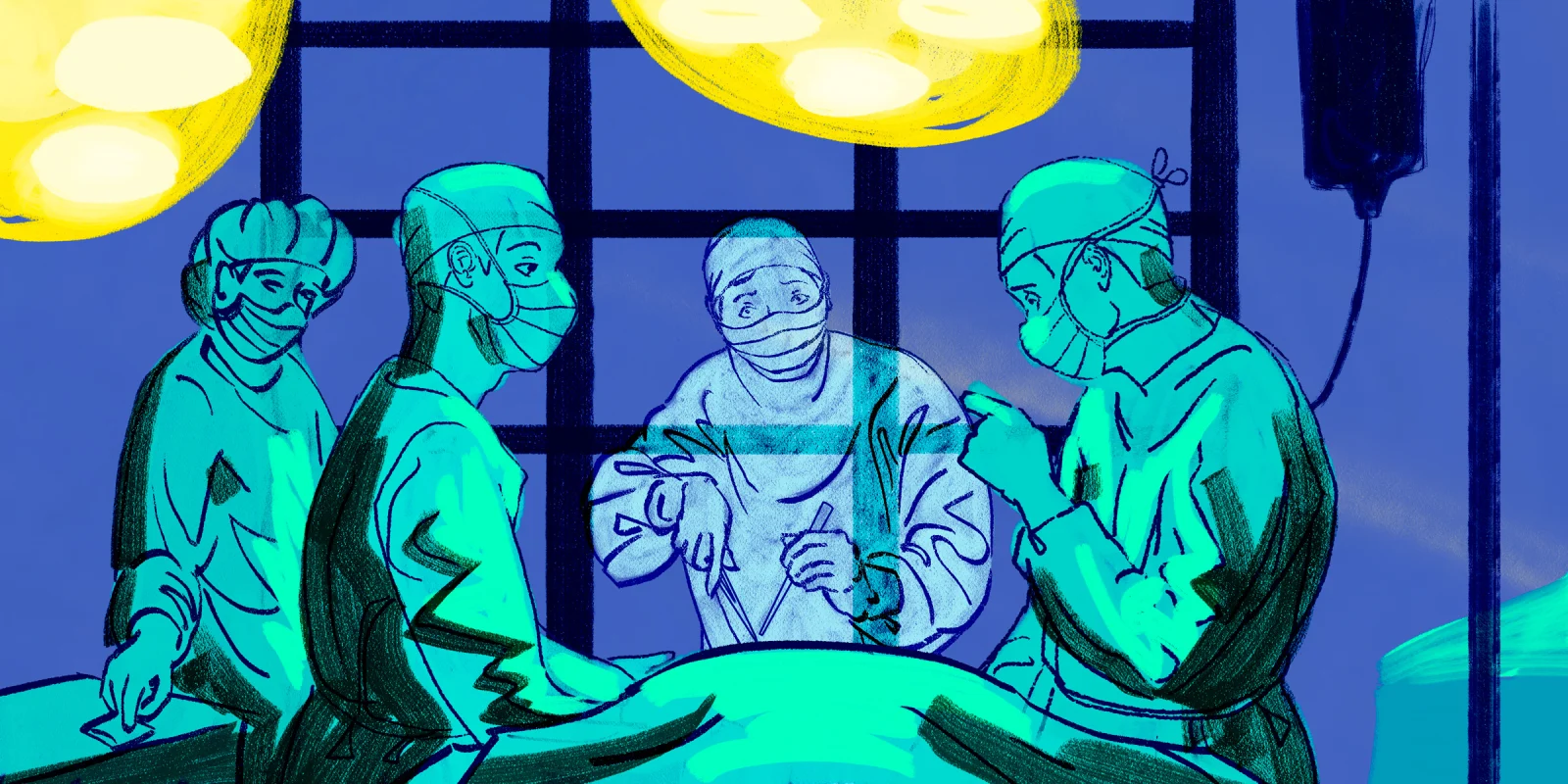“Look at this ‘stache, man,” the attending surgeon remarked, his eyes twinkling with ridicule.
The fellow stared at their patient, unmasked, intubated, and fully under general anesthesia. “She has a husband, you know,” the fellow said, with a raised eyebrow.
“Seriously? Well … I’m just glad I don’t have to go home to that every night,” sneered the attending, casting one last glance at her upper lip, as he fluidly positioned her body for the upcoming surgery he was to perform.
The fellow laughed, and they both went about preparing the patient and the OR table for the long case about to ensue. I stood there, a junior surgical resident, speechless. I stared at the scrub tech, the only other woman in the room. Her eyes mirrored the horror I felt.
“Hey guys, that’s not cool, you can’t say stuff like that,” she blurted out.
The men gave her one look, snickered, then left the room to scrub in, preparing to operate on the patient whose upper lip hair they were just making remarks about. I suppressed my anger and tears and followed them, head down, to scrub in too.
I was a junior resident on a rotation that was known for being “old school” – intense long hours, male-dominated, hierarchical. I witnessed firsthand, along with my co-residents, how certain male surgeons would routinely make derogatory comments about patients behind their backs, like the unedited example above. I witnessed these same surgeons treat female trainees, colleagues, and nurses differently than male counterparts. It was a very “bro” culture — not just locker-room talk, but measurable inequalities in how people are treated, with no repercussions for the perpetrators. My female co-resident and I were consistently offered fewer opportunities to do cases and procedures compared to a male co-resident on rotation with us at the same time. Instead, we were tasked disproportionately with floor work and seeing consults while our male counterpart enjoyed far more operating and favoritism from the other male surgeons. It truly was an old-boys club all day every day.
We witnessed these same male surgeons talk rudely and disrespectfully to nurses in ways that were uncomfortable to witness. One day on rounds I remember a nurse voicing a concern about one of the postoperative patients she was caring for, to which the male surgical fellow rudely and condescendingly dismissed her concern and stormed off. My co-resident and I stared at each other and the nurse, who looked like she was about to cry. No one felt the power to say anything in the moment because these men were powerful bullies and no one held them accountable for their behavior. In fact, they just encouraged each other.
This is not just a story about a particular specialty, department, or institution. It unfortunately is a pervasive pattern of behavior which, though improving over time as the medical workforce becomes more diverse, harkens back to the “good old days” which some physicians perpetuate through toxic behavior. I want this cycle to end. Which is what motivates me to share my experience of reporting sexism and bias encountered as a trainee. Unfortunately, I experienced toxic retaliation and breach of confidentiality from my reporting. If you’ve experienced harassment and discrimination and want to speak up, here is what I wish I had known when I reported.
1. Go to a trusted mentor or confidante with the information before you go report to an authority figure.
While I was still on the rotation, I reported some of the concerns to the person in charge of the rotation. I did not feel dismissed, per se, but I did not feel heard. This meeting was awkward and unwitnessed, and there were no clear action items or check-ins planned by the end of it, and there should have been.
After that meeting I went to a trusted faculty mentor from a different service who connected me with another faculty ally, both of whom supported my and a co-resident’s desire to bring this issue to a higher authority. If possible, ask a faculty ally to come with you when you report to an authority. Medicine and academia are full of stories where discrimination, harassment, and bullying are reported but go unaddressed. Having faculty allies and witnesses is helpful, as is a list of action items from your meeting.
2. Be strategic about when you report in relation to when the events occur.
Sadly, we do not all work in institutions that are free from backlash and handle reporting with 100% confidentiality. Retaliation and backlash, while not allowed, still happen. After the first, awkward meeting, I reported to the second authority within a few months of the events happening (once I was off the said rotation) and found out a few months later that one of the individuals who I reported against was saying derogatory things about me to other trainees. This included him saying that I was a “pathological liar” who accused him “of sexual harassment.” Unfortunately, this was in the context of me being on a different rotation and consulting on a shared patient, to which he apparently remarked that he does not “trust anything” from me because I was a “pathological liar.” To be clear, I never accused this individual of sexual harassment. I was mortified that somehow the information had been so butchered, like a bad game of telephone, that not only had my confidentiality been breached, but that his statement was objectively false in its claim.
This demonstrates two problems. Firstly, that the confidentiality was not in fact guaranteed as it had been promised. Secondly, rumors spread and grow and as someone reporting sensitive information in an academic and potentially malignant environment, you must be prepared to face that risk. If not, then it may be better to wait more time before reporting, perhaps even after leaving the institution. There is no right answer here. If I had to go back and do it all over again, I still would have reported at the same time, but I would have reported to a different authority.
3. Consider reporting to a third party authority, such as the GME office or the university HR department, rather than your own department or division, for accountability.
There is benefit and safety in getting a third party involved, especially in cases of harassment, discrimination, and bullying. There are more eyes on the situation and a higher chance that your confidentiality will be protected and accountability will be demonstrated. University HR and GME offices have official and national resources to help with these formal complaints, which often go through committees and formal investigations. While this might sound like overkill, from my poor experience I really do regret not reporting to a higher third party entity.
4. Retaliation and breach of confidentiality can be traumatic. Do not underestimate the psychological impact it can have on you.
One of the people I reported was a very senior surgeon. A family friend’s acquaintance, another surgeon in a different specialty at the same institution, warned my family friend: “Mo better watch out, she’s messing around with a very powerful surgeon.” How this surgeon found out about my reporting is a mystery to me since I never discussed it with him, though it is not surprising: it is just more proof that confidentiality was grossly violated.
Ultimately, the person I reported did not face any repercussions in terms of disciplinary action. For the next few years that I was still at the institution, he proceeded to give me rude, cold death stares in the hallway, which felt threatening. I would purposely walk in opposite directions to avoid him if I saw him coming my way. I was scared and traumatized because I knew that he knew.
Even writing this article was difficult for me. Reliving the experience of finding out that my confidentiality was breached brings back feelings of anger and sadness. I reported the issues I saw, with my colleague, because we were exasperated by what we were witnessing, not just in how we were being treated, but how patients were being disparaged behind their backs, and other colleagues (nurses, other female surgeons) were being openly disrespected. Summoning the courage to report these things to not one but two authority figures, only to experience retaliation and humiliation, was shocking and stressful.
Ultimately, I do not regret what I did, but I do want others who want to report issues to know that these risks exist. It does NOT make it OK when it happens, but our systems are imperfect — including leadership.
5. Frame it in terms of the system's issues, not personal issues.
When my co-resident and I lodged a formal complaint, we included multiple examples and reasoning about how these behaviors and patterns adversely affect the learning environment and negatively impact patient care because they create a culture where people are afraid to speak up. Ultimately, framing it that way was helpful, as it took the focus off of the actual individuals and their flawed behaviors and made it more of a general concern regarding patient safety and resident education. People have an easier time getting behind those issues rather than calling out sexism and discrimination by powerful physicians. Powerful physicians make the hospital money and have friends in powerful places. As my experience suggests, no matter how egregious the behavior, these individuals are rarely actually punished.
So, to deal with an imperfect system, we must report in a way that everyone can get behind. Which, in this case, meant demonstrating that their unprofessional, discriminatory behavior adversely impacted patient safety, team communication, and the learning environment.
6. Your actions can have positive consequences for others!
Though the experience of reporting these behaviors and the retaliation was painful, there was a positive outcome from all of this. I heard from residents in subsequent years that the rotation was less toxic, more equal in its treatment of male and female residents, and actually a good educational experience. I like to think that our reporting had some impact on this.
Multiple female junior residents expressed to me their gratitude for me and my peer speaking up about what we witnessed in terms of the sexism and discrimination. I do not regret what I did if it positively impacted future learners and helped address some of the ethical and professional concerns on that particular service/rotation.
I am sad that I even had to write this article, but these are the things I wish I had known when I reported. I hope it saves someone else the pain of having to experience retaliation and breach of confidentiality. More than that, I hope one day we do not have to worry about reporting such behavior, because it is truly a thing of the past. But for now, it is still our present.
Dr. Mohini (Mo) Dasari is a general surgeon in Kirkland, WA. She practices and teaches yoga, writes for pleasure, therapy and advocacy, and loves posting her amateur cooking and baking on Instagram @modalala. Her favorite thing to do is spend quality time with her husband, two-year-old daughter, and seven-pound dog. She tweets at @mdmdaware. Dr. Dasari is a 2023–2024 Doximity Op-Med Fellow.
Illustration by Jennifer Bogartz







